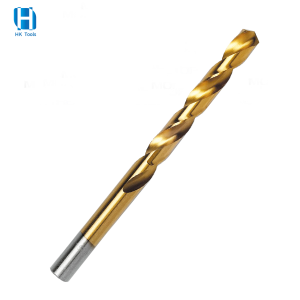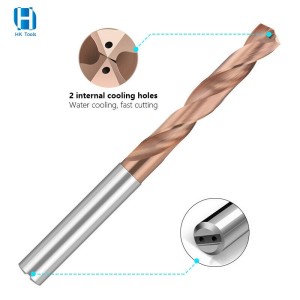HSS Drill Bit VS Carbide Drill Bit
Carbide drills and High-Speed Steel (HSS) drills are two common types of drills used in machining and drilling operations. Here are the key differences between the two:
High-Speed Steel (HSS) drill bits are made from a type of carbon steel that contains high amounts of tungsten, molybdenum, and chromium. These alloying elements enhance their hardness, heat resistance, and durability, making HSS drill bits suitable for a variety of materials and applications.
●Advantages:
1. Versatility: HSS drill bits are incredibly versatile and can be used for drilling into various materials, including wood, plastic, and nonferrous metals.
2. Cost-effective: HSS drill bits are relatively more affordable compared to carbide drill bits, making them a popular choice for general-purpose drilling tasks.
3. Durability: With proper care and maintenance, HSS drill bits can last for a long time. They are less prone to chipping or breaking than other types of drill bits.
●Disadvantages:
1. Limited heat resistance: HSS drill bits can withstand high drilling speeds, but they may lose their hardness and become dull when exposed to extreme heat. Consequently, they are not recommended for high-temperature applications or drilling into hard materials like stainless steel or hardened steel.
2. Less efficient in harder materials: While HSS drill bits can handle a wide range of materials, they may struggle with drilling into harder materials. The cutting edges may wear out quickly, leading to less efficient drilling and the need for frequent sharpening.
3. Reduced precision: HSS drill bits may produce less precise holes compared to carbide drill bits, especially in delicate or critical applications that require high accuracy.
Carbide drill bits, also known as cemented carbide bits or tungsten carbide bits, are made from a combination of carbide (tungsten carbide or titanium carbide) particles and a binding material (usually cobalt). This composition creates an extremely hard and durable drill bit suitable for demanding applications.
●Advantages :
1. Exceptional hardness: Carbide drill bits are renowned for their hardness and resistance to wear. They maintain their sharpness for a longer time, ensuring efficient drilling even in tough materials such as stainless steel, cast iron, or hardened steel.
2. Heat resistance: Carbide drill bits can withstand higher temperatures than HSS bits without losing their cutting performance. This quality makes them suitable for high-speed drilling and applications involving significant heat generation.
3. Precision drilling: Carbide drill bits are known for their accuracy and ability to produce clean, precise holes. This makes them ideal for tasks that require high precision, such as drilling holes for dowels or anchor bolts.
●Disadvantages :
1. Brittle nature: Carbide drill bits are relatively more brittle than HSS bits. They may chip or break if subjected to excessive force or used incorrectly. Therefore, caution must be exercised while operating with carbide drill bits.
2. Limited versatility: Unlike HSS drill bits, carbide drill bits are not as versatile and may not perform well in softer materials like wood or plastic. Using carbide bits on such materials may result in excessive wear or damage to the bit.
3. Higher cost: Carbide drill bits are generally more expensive than HSS bits. The higher cost is primarily due to the composition and production process involved in creating carbide bits. This expense may deter some users who do not require the enhanced characteristics of carbide bits for their drilling tasks.
In Summary
The choice of which drill is better depends mainly on the specific machining needs, material characteristics and production environment. In conventional metal machining, HSS twist drills are the better choice; while in high hardness materials and high efficiency production, carbide drills have obvious advantages.If any questions pls feel free to contact HKTools.
Post time: Jul-04-2024











